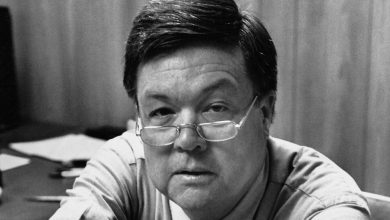The U.S. Must Embrace Palestinian Statehood Now

It is time.
The United States should recognize the state of Palestine and join the 139 other countries that have done so. President Biden, who has the power to grant recognition, should make history and in doing so preserve the possibility of a two-state solution for Israelis and Palestinians.
For decades, U.S. presidents have dangled the prospect of an independent Palestine living side by side in peace and security with Israel. For Palestinians, U.S. recognition has been a mirage. The Israeli government, meanwhile, has actively undermined Palestinian statehood by weakening the Palestinian Authority and fostering deep divisions among the Palestinian people.
U.S. recognition of Palestine would make diplomatic and political sense now, especially since Mr. Biden’s national security team is devising a plan for Gaza after the conflict that was sparked by the Oct. 7 Hamas attack on Israel. The Israeli invasion that followed has killed thousands of Palestinians and devastated the territory. The president this week said international support for Israel was weakening because of its “indiscriminate bombing” of Gaza.
There are four main benefits to recognition. First, American recognition of Palestine would demonstrate to the Palestinian people that the United States is finally matching its talk of peace with meaningful action. Last week’s U.S. vetoof a U.N. Security Council cease-fire resolution and the approval of emergency military sales to Israel before congressional notification indicate continuing support of Prime Minister Benjamin Netanyahu’s war aims.
Mr. Biden could level the diplomatic playing field. U.S. recognition of statehood would confer national legitimacy on the Palestinian people, who would then understand that their 75-year struggle for independence had been accepted by Israel’s closest ally and the leader of the free world. At a practical level, a U.S. ambassador would ensure that Palestinians living in the West Bank and Gaza had a direct line to the president and secretary of state.
Second, U.S. recognition of Palestine would undercut Hamas’s ambitions to establish an Islamic state “from the river to the sea.” Hamas appears uninterested in governing, building a modern economy or connecting the Palestinian people to the community of nations. Its goal remains the destruction of Israel. U.S. recognition would bolster the political capital of Hamas’s rival, the Palestinian Authority; civil society; the business community; and those who are prepared to live in peace with Israel.
Third, recognition would send a strong message of repudiation of the Netanyahu administration, which has done everything possible to diminish the Palestinian Authority, has looked away from settler violence and has damaged the prospects of a two-state solution.
Opponents may raise the moral hazard argument: Why should Washington reward Palestinians for bad behavior? By recognizing Palestine, however, the administration would demonstrate that it does not view all Palestinians as Hamas sympathizers. In fact, according to pre-Oct. 7 public opinion surveys, a majority of Palestinians said they preferred to live in an independent country at peace with Israel. A U.S. policy in support of that desire, including commitments to help rebuild Gaza and to improve the quality of life there, would give the population an incentive to choose new leaders who would work toward achieving the long-deferred Palestinian dream of independence.
The process is not as complicated as it may seem. The U.S. Supreme Court reaffirmed in a 2015 case, Zivotofsky v. Kerry, that the president has the exclusive constitutional power to open diplomatic channels and recognize states. Mr. Biden would not need congressional approval or new laws.
Nor is the resolution of all political and security issues a condition for statehood. In May 1948, for instance, President Harry S. Truman recognized the state of Israel despite regional conflict. After an armistice agreement, Israel’s de facto borders ended up being quite different from the United Nations’ partition plan.
More recently, George W. Bush’s administration officially recognized Kosovo in February 2008. Even now, Serbia refuses to accept Kosovo’s independence or acknowledge its shared border. In July 2011 the United States recognized South Sudan as an independent state, even as its territorial disputes with Sudan remained unresolved. Israel and Palestine’s unsettled borders were not a bar to Israel’s recognition in 1948, and it should not be a bar to Palestine’s recognition now.
Recognizing Palestinian statehood would have a domestic political benefit for Mr. Biden. It would help rally some members of his political base around him. Progressives and many Muslim Americans are so disenchanted with this administration’s Gaza policies that they started an effort to defeat the president in six battleground states — even if Donald Trump would win the 2024 election as a result.
While some Israel supporters in the United States oppose Palestinian statehood, many others would welcome a U.S. effort to prod Israel into acknowledging that a two-state solution is the only path forward for peace. Shoring up Democratic support in battleground states by recognizing the state of Palestine could potentially be a net domestic win for Biden.
Palestinian statehood would not come free of charge. Israel would need to substantially degrade Hamas infrastructure and remove its senior leadership. The Biden administration would then need to articulate its view of a post-Hamas Gaza that would address Israel’s legitimate security concerns. The president should couple U.S. recognition of Palestine with a reaffirmation of the U.S.-Israeli partnership, including the commitment to enhance Israel’s ability to protect itself.
Let us be clear. U.S. recognition of Palestine would not create peace in the Middle East, but it would enhance prospects for a two-state solution to end the conflict between Palestinians and Israelis. Both parties would still need to negotiate just and equitable solutions to borders, security, refugees, the status of Jerusalem, water and future economic relations.
Nevertheless, U.S. recognition of a Palestinian state and a long-term commitment to Israel’s security would go a long way toward building a future in which both peoples could live peacefully together.
R. David Harden (@Dave_Harden) is a former assistant administrator at USAID’s bureau for democracy, conflict and humanitarian assistance; a former USAID mission director to the West Bank and Gaza; and a former senior adviser to President Barack Obama’s special envoy for Middle East peace.
Larry Garber, a former senior USAID policy official during the Clinton and Obama administrations, served as the USAID mission director to the West Bank and Gaza and as an election observer to Palestinian presidential, legislative and municipal elections.
Source photograph by Abid Katib, via Getty Images.
The Times is committed to publishing a diversity of letters to the editor. We’d like to hear what you think about this or any of our articles. Here are some tips. And here’s our email: [email protected].
Follow the New York Times Opinion section on Facebook, Instagram, TikTok, X and Threads.




